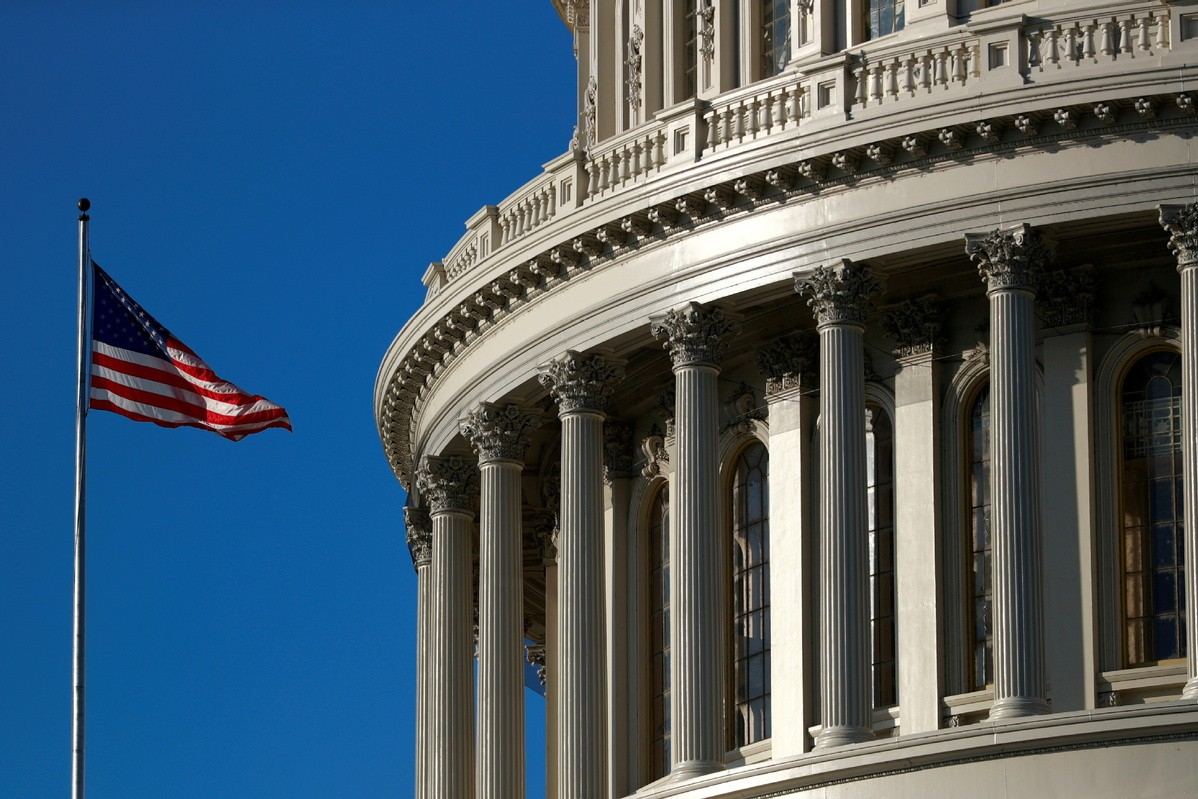Chen Weihua

An American flag flies outside of the US Capitol dome in Washington, US, Jan 15, 2020. [Photo/Agencies]
The All-American Flag Act signed into law by US President Joe Biden on Tuesday is aimed at promoting patriotism, but it actually exposes the sorry state of US politicians whose confidence in their own country seems to be weakening.
The act, introduced by Republican Senator Susan Collins of Maine and Democratic Senator Sherrod Brown of Ohio, mandates that the federal government purchase only those flags that are 100 percent made in the United States, compared with the previous requirement of just 50 percent.
If this is an example of US exceptionalism, it is certainly not in a good sense.
Americans are indeed patriotic. During my years of higher studies and work in and travel across the US, I saw more Americans displaying the national flag outside their apartment windows and in their yards and shops than I have seen in any other country, including in European countries.
The law has a strong anti-China tone because the US imports millions of flags from China — in 2017, it imported about 10 million national flags, with 99.5 percent of them coming from China.
The fact that China has not introduced legislation banning the production of US national flags due to those hostile US politicians shows China is much more open-minded, and less ideological and confrontational than the US government and lawmakers.
By demonstrating their country's strength through such a law, the US leaders and lawmakers are exposing their lack of confidence in their own country; in fact, the law is a sign of their weakness.
Senator Collins said: "the American flag serves as a symbol of our identity, resolve, and values as one people. To honor its significance, the federal government should only use flags entirely manufactured in the United States".
According to her logic, the flag act should be expanded to cover the US' state and local governments, because they too need to demonstrate their American identity and values. If so, should US lawmakers introduce bills that require the White House and the federal government to purchase only made-in-US furniture and office supplies? How about the suits, socks, shoes and underwear worn by the US president, because wearing 100 percent made-in-US clothes and shoes will make him look like a true POTUS to US citizens like Collins and Brown?
Or, how about a bill requiring US presidential campaigns to only use mementos made entirely in the US?
It is no secret that many items, from caps to T-shirts, sold in the Republican and Democratic parties' gift shops during presidential campaigns are made in China. I have seen firsthand the 2016 US presidential campaigns of former US secretary of state Hillary Clinton and former president Donald Trump. Many of the Made-in-China labels in the Democratic National Convention gift shops were removed beforehand to avoid controversy. The list of such deceitful activities is very long.
The argument made by the two senators that the flag act will help create jobs in the US is totally false, because it is against Econ101 principles of microeconomics on comparative advantage. The US-made flags are far more expensive than the imported ones. Forcing the US federal government to buy such expensive flags will only contribute to the ballooning of the US' national debt, which hit an astronomical $35 trillion on Monday.
The flag act is an attempt to cash in on the growing anti-trade and pessimistic sentiment among US citizens, because according to a Pew survey released on Monday, about 59 percent of Americans say the US has lost more than it has gained in terms of the cost and benefit of increased trade with other countries. And Gallup's Economic Confidence Index, also released on Monday, continues to show the long-term trend of negative public sentiment with regard to the current state and the future of the US economy.
But resorting to jingoism, in the name of promoting patriotism, and trade protectionism as reflected in the flag act will not help revive the US' manufacturing sector. Instead, it will make things worse. And that's why other countries have no interest in introducing such an absurd law.
(Chen Weihua is chief of China Daily EU Bureau based in Brussels.)
-
Scope wide for Sino-ASEAN ties
Scope wide for Sino-ASEAN ties
-
Stronger ties with Mekong nations stressed
Stronger ties with Mekong nations stressed
-
Universities to optimize disciplines
Universities to optimize disciplines
-
Museums bask in spotlight of cultural appeal
Museums bask in spotlight of cultural appeal